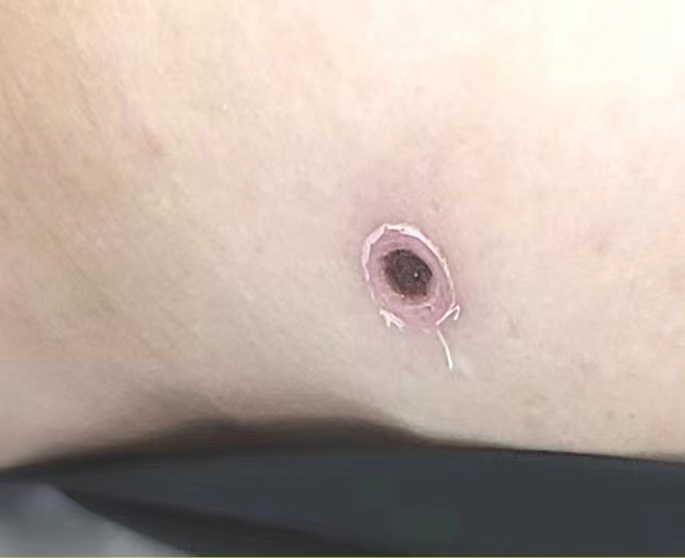One day, when Mrs. Lin returned home after working in the field, she had a sudden onset of fever, reaching 40 ℃ (or 104 ℉). She visited several local hospitals, yet the fever persisted, and conditions worsened, with dysfunction in heart, kidneys, lungs, and liver.
Finally, she turned to the Sun Yat-sen Memorial Hospital, where the emergency team gave her a thorough examination and found a round, dark eschar on the left side of Lin’s chest.
“That was when we realized it was a severe case of scrub typhus,” said Dr. Liu Weipeng, who received Lin and then transferred her to the Emergency Intensive Care Unit for further treatment.

The eschar found on Lin’s skin. (Photo provided to GDToday)
The team treated Lin with intubation and ventilator support when more examinations showed she had developed heart and respiratory failure. They applied blood purification for Lin as they found her with severe metabolic acidosis.
After days of treatment and care, Lin finally turned stable and was free of the support devices. However, the cardiac damage and dysfunction caused by the disease posed a great challenge for the emergency team.

During treatment. (Photo provided to GDToday)
They decided to work with different departments to develop a new treatment plan. The conclusion was to calm Lin’s overactive sympathetic nervous system and use cardioversion medication and a stronger sedative at the same time. With the adjustment, Lin’s heartbeat returned to normal.
Then, however, came another twist — delirium. The emergency team upgraded the treatment again, implementing rehabilitation after critical illness and family-involved supportive psychotherapy. Coupled with medication, Lin’s mental symptoms were relieved.
What is scrub typhus?
Scrub typhus is an acute infectious disease caused by a bacteria called Orientia tsutsugamushi, said Prof. Yang Zhengfei, deputy director of the Department of Emergency Medicine of the hospital. In recent years, the incidence of scrub typhus in Guangzhou has reached 5.76 per 100,000, while Zengcheng and Conghua districts have recorded a higher incidence rate than other districts.
The disease is mainly passed by rats, while rabbits, pigs, cats, and poultry can also be infected. It is spread to people through bites of chiggers, a tiny mite.
Experts say that patients with scrub typhus recover well with immediate diagnosis and treatment, yet without which or with underlying diseases, patients may progress to multiple organ failure and respiratory failure. The death rate of severe cases can be 30 percent, and for those without appropriate treatment, the death rate reaches 60%.
Symptoms
Symptoms begin about 4 to 21 days (mean 10 to 14 days) after being bitten by a mite or chigger, including fever, chills, headache, body aches, enlarged lymph nodes, and rashes.
The rash does not cause itches; patients are often unaware that they have a rash. It needs a thorough physical examination to find eschars or lesions to confirm the disease.
Treatment
Early detection is the key to treating the illness. Early scrub typhus can be cured with symptomatic treatment and medicaments containing tetracycline, such as minocycline and doxycycline.
The patient’s fever will be brought down by 24 to 72 hours after taking the medicine, and using drugs for 7 to 10 days will basically see recovery. The specific course of treatment requires further judgment by the doctor
The drugs should be used with caution in children under the age of 8, and people should avoid exposure to sunlight to prevent photosensitive dermatitis.
The medication should be under the doctor’s instruction.
Prevention
Eliminate rats and chiggers in your area.
Protect yourself from chigger bites.
1.Do not linger in grass, bushes, and woods.
2.Use insect repellent on your exposed skin.
3.Wear long-sleeved clothes and trousers.
For those who have chigger bites or have been in the field, go to the hospital if symptoms appear, such as recurrent high fever, rashes, eschars, and enlarged lymph nodes, and report your field history to the doctor.
Author | Teria Wang (intern), Hannah
Editor | Olivia, Steven, Will, Jerry
















